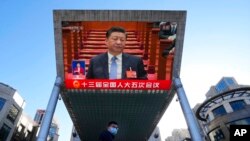In the weeks before he ordered the invasion of Ukraine, Russian President Vladimir Putin traveled to China for a meeting with President Xi Jinping in which they signed a comprehensive cooperation agreement aligning their countries in the ongoing struggle for global influence between Western democracies and rising authoritarian states.
Now, it’s not completely clear that China knew what it was getting into.
Three weeks after Xi put his name on the document declaring that friendship between Russia and China “has no limits” and “no ‘forbidden’ areas of cooperation,” Putin’s invasion of Ukraine has turned Russia into an international pariah, facing devastating sanctions and condemnations from around the globe.
Diplomatic tightrope
For their part, Chinese diplomats have been attempting to walk a tightrope, making high-minded statements about the importance of peace and respect for other countries’ territorial integrity, while studiously avoiding any mention of the fact that it was China’s close ally that launched the bloody war raging in Ukraine.
Writing in The Washington Post on Tuesday, China’s ambassador to the U.S., Qin Gang, insisted that his country had been taken by surprise by the invasion. He sidestepped the question of whether Russia has requested weapons and other supplies from China, as a number of news outlets have reported.
China’s position on Ukraine, he wrote, is that “the purposes and principles of the U.N. Charter must be fully observed; the sovereignty and territorial integrity of all countries, including Ukraine, must be respected; the legitimate security concerns of all countries must be taken seriously; and all efforts that are conducive to the peaceful settlement of the crisis must be supported.”
Slight distancing
While China can’t be said to have distanced itself from Russia over the invasion, the comments by its senior leaders have also fallen short of an endorsement of Putin’s actions. This may reflect a desire to maintain relations with Moscow without damaging China’s reputation with the rest of the world, according to analysts.
“This new partnership agreement that Putin and Xi signed on February 4 certainly raised the possibility as this war rages that China could be judged guilty by association,” Stephen Roach, a senior fellow at Yale University’s Jackson Institute of Global Affairs, told VOA.
Timothy Heath, a senior international defense researcher at the California-based RAND Corporation, told VOA in an email that a desire to maintain good relations with the West may affect China’s willingness to provide assistance to Russia as the conflict continues.
“I do not think China will change its pro-Russia stance any time soon, but it is likely to continue limiting how much help it provides Russia due to Beijing’s desire to maintain good relations with the West, which is far more important to China’s economic development than Russia,” he wrote.
Unexpected results
Experts say whether or not China knew what was coming in Ukraine, its leaders probably hoped Russia’s invasion would be over quickly.
“Perhaps Beijing was hoping for a short, sharp action through which the Russian military would roll over Ukrainian forces and annex the eastern part of Ukraine in the same manner as it did in the Crimea in 2014,” said Anthony Saich, a professor of international affairs and director of the Ash Center for Democratic Governance and Innovation at Harvard University’s Kennedy School of Government.
“In that scenario, Western outrage would have soon died down, and China would have continued undisturbed in its attempts to present a united front with Russia against a declining and divided West,” he told VOA. “The resistance of Ukrainian forces and its people has put an end to that illusion, and the West’s united and relatively strong response has changed the calculus.”
China’s leverage
Roach said China may have a better chance than any Western government at persuading Russia to change course.
“China is in a unique position because of its partnership agreement with Russia to exercise leverage over Vladimir Putin,” he said. “That is considerably greater than the sanctions that have been imposed by the U.S. and the West.
“Putin has not changed his military posture in response to unprecedented sanctions, and that's a source of enormous frustration in the West. But China has something that the West does not have, and that is the partnership and the support that comes from that partnership. Russia is a tiny economy, it cannot possibly support a massive conventional war against a country like Ukraine, and it doesn't have the wherewithal to do it.”
Robert Ross, a professor of political science at Boston College and an associate of Harvard’s Fairbank Center for Chinese Studies, said the United States could make the prospect of limiting support for Russia more attractive to China.
“There needs to be some way for America to signal China that there will be some appreciation for Chinese restraint and that the Americans would take this into account as we go forward, because they (China) want to be sure that there is a value in cooperating with America,” he said. “This is the price Americans pay because now, we're asking for China’s cooperation in the ongoing crisis.”
VOA Mandarin Service reporters Si Yang and Lin Yang contributed to this story.




